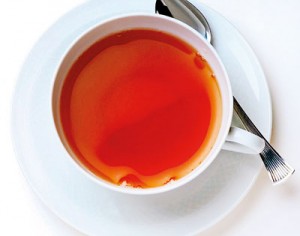Sunday Times 2
Tea breaks aren’t a waste of time at work: Scientists
Bosses worried that staff are wasting time on tea breaks could not be more wrong, for a new study suggests drinking a cuppa could unlock their hidden potential.
The research found the process of making and drinking a cup of tea boosts mood and tended to enhance creative problem solving.
The work was carried out by researchers for the Unilever food giant, which makes the Lipton tea brand and is opening a string of tea shops under the T2 brand, however it has been independently reviewed and accepted by a scientific journal.

Tea contains caffeine and theanine, which are linked to relaxation, and could be making tea drinkers happier
Lead scientist Suzanne Einother said: ‘These findings appear to confirm what many of us suspect; that the close to sacred ritual of the tea break can effectively boost your mood, which in turn can lead to other benefits such as improved problem solving.
‘We suspect this effect is down to a combination of elements including aspects of tea preparation and the taste and aroma during consumption as well as simply taking a break from other activities.’
The presence of caffeine and theanine, which is an amino acid that has been linked to relaxation, may be factors in the positive results.
The experiments were carried out by the company in Holland and involved a group of 150 people, including 116 women, who described themselves as regular tea drinkers.
One group were asked to make and drink a cup of tea, using hot water, milk and sugar, as they normally would, a second was given some sweets and the third was given a glass of water.
Participants were then tested to assess their mood, creativity and motivation to assess the impact. The tests asked people to recount a recent happy event, take part in word games, draw an alien creature, and solve anagram puzzles.
The study found people who drank the tea had a greater desire for success in the tests than those given water, while they also had a faster response time when faced with difficult problems

Having a tea break can significantly boost mood and increase workers' productivity, scientists found
The team’s scientific paper said: ‘There was a significant effect of the condition on valence – pleasure – and arousal. Water consumption provoked lower pleasantness than tea consumption.’
It said the simple process of getting up from a desk to take a break and have a cup of tea may lead to a longer improvement in mood and well-being.
The paper stated: ‘With the ever-growing evidence on the role of positive emotions in short and long term well-being and success, it is viable that simple everyday activities generate small improvements in mood which may accumulate to greater benefits over time.’
However, significantly, the study found that giving a control group some sweets before they carried out the tests was just as effective in boosting mood, if not even more beneficial.
The results are due to be published in the journal Food Quality and Preference and may well encourage a return of the tea break, which has come under pressure with staff reluctant to be seen as slackers.
A host of other studies have found physical benefits from drinking tea to add to the improvements in mood.
People who drink tea four times a day for six weeks were found to have lower levels of the stress hormone cortisol, which may play some part in the results seen by the Unilever team.
Recent research in China found people who drink two or three cups of tea a day were 37 per cent less likely to suffer a hip fracture. Another by a team in Paris suggested it is particular good for heart health because of the presence of beneficial flavonoids, which are a type of antioxidant.
Other studies have claimed that drinking three to four cups of tea a day can cut the chance of a heart attack and help prevent certain types of diabetes.
© Daily Mail, London

